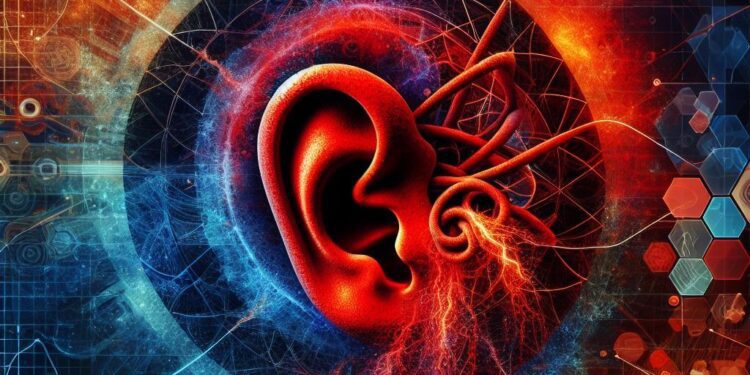In the quiet corridors of medical inquiry, where every ailment whispers its own narrative, a curious question emerges from the shadows: Can chronic pain cause hearing loss? This seemingly peculiar connection unravels a tapestry woven with threads of human suffering and the enigmatic symphony of our bodily functions. As we navigate the intersection of persistent discomfort and the delicate mechanics of the ear, an exploration unfolds not just within the confines of medical journals, but through the lived experiences of many whose stories often go unheard. Join us as we delve into the intricate dance between chronic pain and auditory health, seeking to illuminate the pathways that bridge these two realms.
Detailed Answer
The intricate relationship between chronic pain and hearing loss lies in the physical and neurological disruptions caused by persistent pain conditions. Chronic pain can originate from a variety of sources such as arthritis, nerve damage, or even migraines. When the body experiences prolonged pain, the prolonged state of stress and inflammation can have diverse effects on overall health, potentially including auditory health.
Several pathways may contribute to this complex interaction, for example:
- Stress Response: Chronic pain often triggers a constant stress response that releases cortisol and other stress hormones, which may negatively impact the auditory system over time.
- Neurological Impact: Pain can disrupt the brain’s neural networks, affecting areas responsible for auditory processing.
While direct evidence linking chronic pain with hearing loss remains under investigation, understanding how chronic pain impacts overall health can aid in providing comprehensive care. Some practical advice for those who believe their pain may be affecting their hearing includes:
- Regular Check-ups: Ensure frequent medical examinations to monitor both pain levels and auditory health.
- Manage Stress: Implement stress-reducing activities such as meditation, yoga, and relaxation techniques.
- Seek Comprehensive Treatment: Engage in multidisciplinary approaches including physical therapy, cognitive-behavioral therapy, and proper medication management.
Below is a comparison of common interventions and their efficacy in managing chronic pain and potential auditory health impacts:
| Intervention | Effectiveness for Chronic Pain | Potential Impact on Hearing |
|---|---|---|
| Prescription Medications | High | Varied – Some medications may have ototoxic effects |
| Physical Therapy | Moderate to High | None identified |
| Stress Management Techniques | Moderate | Positive – Reducing stress can indirectly benefit auditory health |
Practical Advice
It’s crucial to address both chronic pain and hearing health proactively. Here are some steps you can take:
- Regular Check-ups: Schedule annual appointments with both your primary care doctor and an audiologist. Early detection can catch potential issues before they escalate.
- Pain Management Techniques: Incorporate methods such as mindfulness, meditation, and gentle exercise to manage chronic pain, which may mitigate its indirect effects on hearing.
- Protect Your Ears: Avoid exposure to loud noises and use ear protection in noisy environments. Chronic pain may lower your tolerance for loud sounds, amplifying their adverse effects.
Key Actions and Their Benefits:
| Action | Benefit |
|---|---|
| Annual Medical Check-ups | Early detection of both pain and hearing issues |
| Mindfulness and Meditation | Reduces pain levels and stress, improving overall well-being |
| Ear Protection | Prevents damage from loud noises |
Conclusion
while chronic pain and hearing loss might seem unrelated, they can indeed be interconnected through various mechanisms. Chronic pain can lead to stress, anxiety, and alterations in brain function, all of which may indirectly contribute to hearing loss. Additionally, certain medications used to manage chronic pain may have ototoxic effects, which can damage the auditory system.
For those dealing with both chronic pain and hearing loss, it’s important to consider a multi-faceted approach to treatment:
- Holistic Care: Combining medical treatments with physical therapy and psychological support can address both pain and hearing issues holistically.
- Regular Monitoring: Frequent check-ups with healthcare providers to monitor changes in hearing and manage pain medications effectively.
- Adapting Lifestyle: Engaging in activities like yoga, mindfulness, and healthy eating can reduce stress levels, potentially mitigating both pain and hearing loss.
Here’s a quick comparison of the primary treatments:
| Treatment Type | Primary Focus | Benefits |
|---|---|---|
| Medication | Pain Management | Immediate Relief |
| Physical Therapy | Mobility & Strength | Reduces Pain |
| Psychological Support | Mental Health | Stress Reduction |
Wrapping Up
As we navigate the intricate labyrinth of chronic pain and its potential to extend beyond the norm into the auditory realm, the conversation doesn’t end here. Unraveling the threads connecting chronic pain to hearing loss invites not only further clinical investigation but also a more profound understanding of the human body’s interwoven nature. While definitive answers may still be on the horizon, awareness and dialogue illuminate the path ahead. Let us continue to listen to the whispers of our bodies, bridging the gaps between science and the senses, in the hope of fostering a future where silence never falls on those seeking relief.














